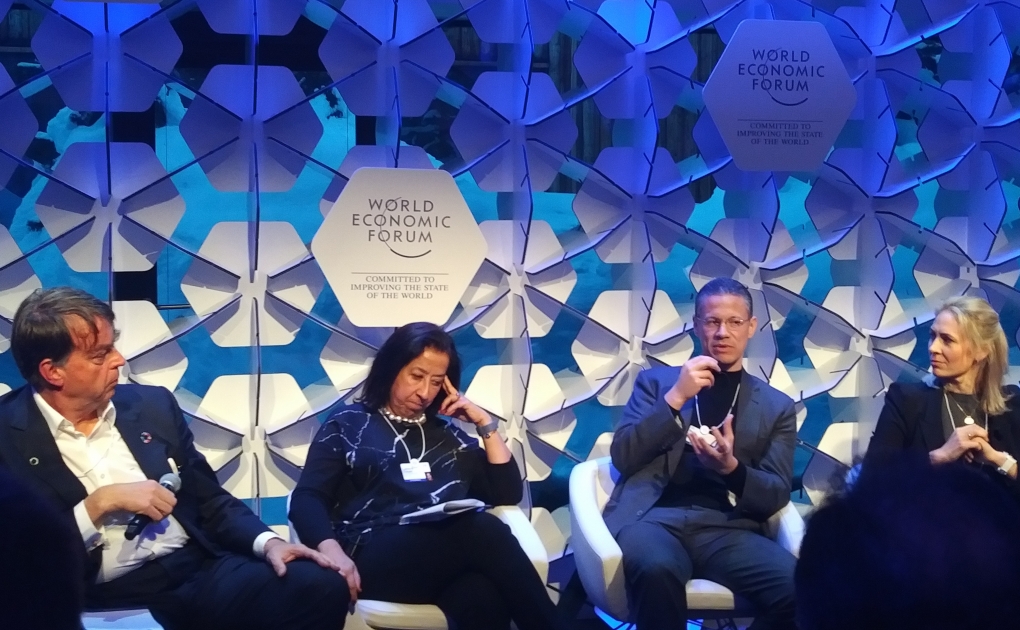
Family Businesses to drive Sustainable Development across the Middle East
Family-owned businesses are uniquely placed to shape the fourth industrial revolution to ensure it is empowering and human-centred, rather than divisive and dehumanizing, Badr Jafar, Chief Executive Officer of Crescent Enterprises and Managing Director of the Crescent Group, told delegates at a public session titled, ‘The Family Business Case’ at the World Economic Forum in Davos, Switzerland. Other panellists included Andre Hoffmann, Vice Chairman of pharmaceuticals giant Roche, and Lubna Olayan, Chief Executive Officer of Olayan Financing Company.
Badr Jafar stated in an opening address that “Family businesses are the epitome of human commerce, and tend to be deeply connected to our employees, stakeholders and communities. Our stakeholders know us and the values that we represent. Therefore the key to being successful and sustainable in the era of this technological revolution will be to leverage these natural advantages while being realistic about the things we need to change about ourselves.”
According to the Family 500 Index, the world’s 500 largest family businesses produce $6.5 trillion per year in sales and employ over 21 million people – enough to make them the third largest economy in the world behind the US and China. In the Middle East and North Africa region, 85 per cent of non-oil GDP is generated by family businesses that are set to hand down assets totalling more than $1 trillion to the next generation within the next ten years.
The discussion outlined that, unlike many companies whose financial impact is constantly being evaluated on a quarterly basis, family businesses are generally more capable of pursuing a long-term, value-driven strategy, which results in these businesses enjoying higher levels of trust and loyalty than other types of companies. According to the Edelman Trust Barometer, family-owned companies are significantly more trusted than public companies, state-owned businesses or even NGOs. Jafar added, “We can choose to either take this trust for granted, or use it to help us work with all our stakeholders to shape this revolution in a manner that improves the state of the world, which will also in turn enhance this trust even further.”
However the sustainability of many family businesses worldwide, including in the Middle East, is plagued by a myriad of challenges related to poor governance codes, often leading to failed succession and depletion of wealth and assets. For this reason, family businesses are increasingly embracing the business case behind good governance – according to a recent research report released by the Pearl Initiative, the leading non-profit organisation promoting a culture of corporate transparency and accountability, 89% of the 350 companies surveyed across the Gulf Region believed that improved corporate governance standards are essential to the survival and growth of business in the region.
The panel session also addressed how family businesses can take the lead in investing in socially-centred business models that seek to address the numerous challenges faced across the Middle East, including environmental, job creation, and humanitarian. Badr Jafar presented an example of Crescent
Enterprises launching CE-Ventures, the business’ corporate venture capital platform, which is on target of investing $150 million in social innovation by 2020 across a diverse range of sectors including education and healthcare; and CE-Creates, an internal incubation platform, which has been fostering innovation by incubating and growing businesses with a measurable social and environmental impact, including electric mobility solutions being rolled out across the region and a global line of industrial workwear for hot climates.
The World Economic Forum was held in Davos from January 22-25, with over 3,000 senior political, business, and cultural leaders from around the globe in attendance, including over 60 heads of state.


























